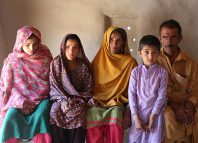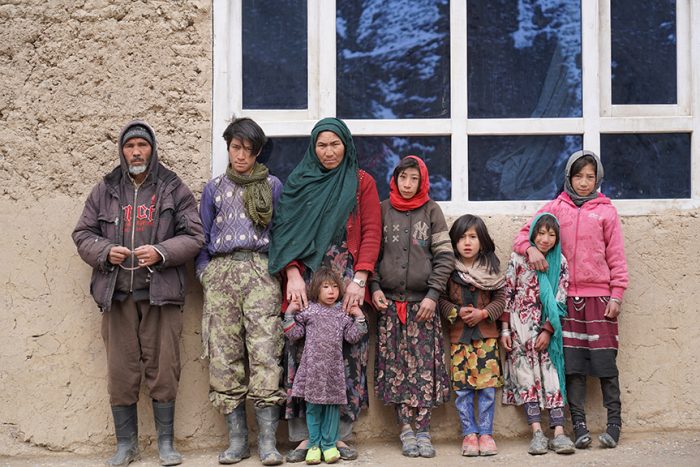Bread on the Table: Nourishment through Aid
Khaleeq, a seasoned farmer residing in Sabz Ab village1, leads a household of nine members. Together with his wife, they care and provide for their children and navigate the complexities of raising five daughters and two sons, all under the age of 17 years. Their journey, however one filled with unity and love, is marked by significant challenges. Three of their daughters are born with a neurodevelopmental disorder, which impedes their ability to learn and adapt as quickly as other children would and sets them apart from the rest. Education remains an elusive dream for most members in the family, including Khaleeq himself. With overwhelming economic constraints since childhood, Khaleeq’s own education stopped at grade eight and now for his eldest son’s at grade seven.
Reflecting on the past, Khaleeq’s wife recalls the frailty of their daughters at birth, initially dismissed as a consequence of poverty and food insecurity. Sadly, the realisation that their daughters’ growth deviated from the norm came too late for any medical intervention, primarily due to financial incapacity.
Yet, a glimmer of hope emerged in early 2021. Under the former government, a program was launched to offer monthly assistance to individuals with disabilities. The Khaleeq daughters were finally seen and helped. This lifeline, however, proved short-lived. With the change in government, the program came to an abrupt end, plunging the family back into despair.
Khaleeq describes his life with a tinge of bitterness – a life devoid of joy, burdened by the challenges his daughters and they as parents face. “They struggle to learn and behave normally,” he confides, “Their condition has shattered our dreams to provide a better life to our children.”
The family’s only source of income comes from their small farm, a mere three Jeribs2 of land. Once fertile, the soil has now succumbed to recent droughts, yielding a meagre harvest of potatoes and wheat. A meagre income of around AFN 4000 (Approx. USD 60) barely sustains their large family. Food insecurity has been a constant battle. Sometimes, the family afford’s only one meal a day, with scarce resources forcing them to cook only three times a week. “It pains me deeply,” Khaleeq confesses, “I cannot seem to provide enough for my children.”
Khaleeq’s wife takes care of the house and the children, with their eldest daughter helping out with the chores. Their elder son tries to find work, but there are not many jobs in the village. Sending him to another country to work, like Iran, is too risky. “He’s too young,” says Khaleeq as he worries someone might exploit him. The little money they make from farm work and odd jobs often goes into buying fuel to stay warm during the harsh Bamyan winters.
In a turn of fortune, late November 2023 saw the Khaleeq family selected for a relief project by Community World Service Asia, supported by Canadian Foodgrains Bank (CFGB) and Presbyterian World Service & Development (PWS&D). This intervention brought not only financial relief but also emotional respite, allowing the family to enjoy regular meals and a more nutritious diet for the first time in months. With USD 112.5 provided in three instalments, they could afford basic necessities and kitchen essentials, reducing their burdens and bringing back a sense of joy in their lives.
“I bought flour, oil, beans, and sugar. For the first time in months, my children were able to eat three meals in a day.” The worry etched on their faces began to fade, replaced by a quiet sense of relief.
With their pantry full and hope back in their hearts, the Khaleeq family looks forward to the future. Khaleeq dreams of a more permanent solution, something that will help his family in the long run. Theirs is a story of strength, showing how families stand together and keep going through hard times.







